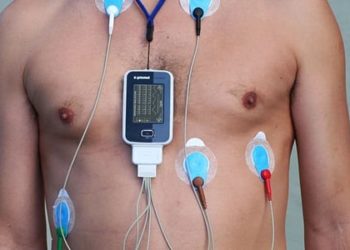Paternal distress predicts poor early childhood mental health
Jan 7th – Prenatal paternal psychological distress was associated with higher levels of behavioral, emotional, and social difficulties in 3-year-old children. [tabs tab1=”2MM Rundown” tab2=”Full 2MM Report” tab3=”About the Authors”]
[tabs tab1=”2MM Rundown” tab2=”Full 2MM Report” tab3=”About the Authors”]
[tab]
Image: PD
1. Prenatal paternal psychological distress was associated with higher levels of behavioral, emotional, and social difficulties in 3-year-old children.
2. Findings remained after controlling for maternal mood symptomatology.
This study shows a connection between prenatal paternal mental health and psychological wellbeing of children at 3-years-old. The study, strengthened by its prospective nature, showed small but significant findings consistent with previous research. A lack of postpartum mental health assessment for the fathers makes it difficult to determine how and when their prenatal psychological status influences childhood development. Potential reasons for the relationship observed include underlying shared genetics influencing the child’s resultant psychological status, prenatal paternal mental status leading to postpartum difficulties with childrearing, and poor paternal mental health influencing maternal mental health and ultimately the child’s development. However, the design of the study does not allow for a differentiation between these causal mechanisms.
As the measures used in this study are not diagnostic for psychiatric disorders and do not target more general distress beyond mood symptoms, future research that includes exploration of additional mental illness symptoms would likely aid in deciphering the connection between the mental health of father and child. With mental illness presenting in a significant portion of the male population, the current study emphasizes the need for physicians to address the psychological wellbeing of both parents to aid in maintaining the mental health of their children.
Click to read the study in Pediatrics
[/tab]
[tab]
Image: PD
1. Prenatal paternal psychological distress was associated with higher levels of behavioral, emotional, and social difficulties in 3-year-old children.
2. This was true after controlling for maternal mood symptomatology.
Primer: Substantial evidence indicates that poor maternal mental health is associated with negative emotional, social, and behavioral outcomes in offspring. While maternal mental health problems are believed to place a child at higher risk for mental health problems in life than poor paternal mental health, the fact that nearly half of both men and women will meet criteria for a mental health condition during their lifetime puts all children of mentally ill parents at potential risk. Fewer studies have investigated the specific role of paternal mental health on childhood mental health; however, data show that paternal depressive and anxiety symptoms independently influence child mental health. The current study aimed to further elucidate the role of prenatal paternal mental health on childhood behavioral, emotional, and social development.
Background reading:
2. Paternal depressive symptoms and child behavior or emotional problems in the United States
This [prospective, population-based cohort] study: included 28,733 fathers and 31,663 children from the Norwegian Mother and Child Cohort study. Scores on The Hopkins Symptoms Checklist, a measure of global distress including depression and anxiety, were used to quantify paternal mental health symptoms at week 17 or 18 of gestation. Child mental health was assessed at 3-years-old.
After controlling for mothers’ mental health, significant associations were found between prenatal paternal psychological stress and child behavioral, emotional, and social difficulties at 3-years-old. When paternal demographics were adjusted for, logistic regression analysis showed small, but significant increases in the odds of children of fathers with mental health difficulties experiencing emotional or social functioning issues at the age of 3.
In sum: This study shows a connection between prenatal paternal mental health and psychological wellbeing of children at 3-years-old. The study, strengthened by its prospective nature, showed small but significant findings consistent with previous research. A lack of postpartum mental health assessment for the fathers makes it difficult to determine how and when their prenatal psychological status influences childhood development. Potential reasons for the relationship observed include underlying shared genetics influencing the child’s resultant psychological status, prenatal paternal mental status leading to postpartum difficulties with childrearing, and poor paternal mental health influencing maternal mental health and ultimately the child’s development. However, the design of the study does not allow for a differentiation between these causal mechanisms.
As the measures used in this study are not diagnostic for psychiatric disorders and do not target more general distress beyond mood symptoms, future research that includes exploration of additional mental illness symptoms would likely aid in deciphering the connection between the mental health of father and child. With mental illness presenting in a significant portion of the male population, the current study emphasizes the need for physicians to address the psychological wellbeing of both parents to aid in maintaining the mental health of their children.
Click to read the study in Pediatrics
By [LHC] and [DB]
More from this author: Adolescents seeking weight loss treatment at higher risk for weight-based bullying; Enclosed tobacco displays appear to dissuade teens from purchasing tobacco products;New AAP policy statement endorses use of emergency contraception for adolescents; Increased autism diagnoses observed in pregnant women with viral influenza, fever or using antibiotics
© 2013 2minutemedicine.com. All rights reserved. No works may be reproduced without written consent from 2minutemedicine.com. Disclaimer: We present factual information directly from peer reviewed medical journals. No post should be construed as medical advice and is not intended as such by the authors or by 2minutemedicine.com. PLEASE SEE A HEALTHCARE PROVIDER IN YOUR AREA IF YOU SEEK MEDICAL ADVICE OF ANY SORT. Content is produced in accordance with fair use copyrights solely and strictly for the purpose of teaching, news and criticism. No benefit, monetary or otherwise, is realized by any participants or the owner of this domain.
[/tab]
[tab]
 Leah Carr: Leah Carr is a 2010 graduate of Bates College and a 3rd year M.D. candidate at the University of Vermont College of Medicine.
Leah Carr: Leah Carr is a 2010 graduate of Bates College and a 3rd year M.D. candidate at the University of Vermont College of Medicine.
 Devika Bhushan: Devika is a 4th year M.D. candidate at Harvard Medical School.
Devika Bhushan: Devika is a 4th year M.D. candidate at Harvard Medical School.
[/tab]
[/tabs]




